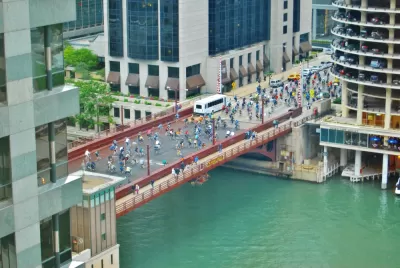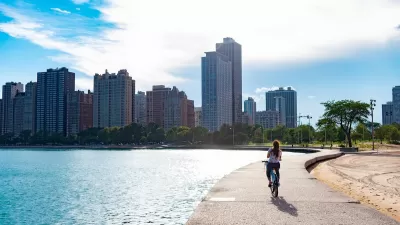Chicago's transportation commissioner says the city's transportation department is exploring options for keeping cars out of bike lanes, such as raised curbs.

Chicago Transportation Commissioner Gia Biagi says it's time to update the city's decade-old cycling plan to include improved safety measures such as raised curbs separating bike lanes from traffic. As Fran Spielman reports in the Chicago Sun Times, Biagi, in a virtual address to the Rotary Club of Chicago, said that "the city is exploring ways to 'embed into the infrastructure' bike lanes that keep cars out." According to Audrey Wennink, director of transportation for the Metropolitan Planning Council, "Chicago desperately needs more protected bike lanes of all types, whether they’re raised or separated by bollards, curbs, parked cars or other barriers."
To date, the city has installed around half of the 645 miles of bike lanes identified in the Streets for Cycling Plan 2020, which aimed to make Chicago "the best big city for bicycling in the United States." According to Wennink, "What the Metropolitan Planning Council really wants to see is the 'build-out of networks of bike lanes' to make cycling viable" and safe for people of all ages. "We see a lot of patchworks of installations that are often related to aldermanic priorities," Wennink said.
The "burst of activity" that followed the installation of the city's first bike lane ten years ago has seen a "dramatic slowdown." Now, Biagi hopes to reinvigorate the bike lane program. "I’d rather have one mile of the best connections — of filling in the gaps in the network — than the big muscly statistics."
FULL STORY: Raised bike lanes to be installed in Chicago to better protect cyclists

Maui's Vacation Rental Debate Turns Ugly
Verbal attacks, misinformation campaigns and fistfights plague a high-stakes debate to convert thousands of vacation rentals into long-term housing.

Planetizen Federal Action Tracker
A weekly monitor of how Trump’s orders and actions are impacting planners and planning in America.

In Urban Planning, AI Prompting Could be the New Design Thinking
Creativity has long been key to great urban design. What if we see AI as our new creative partner?

Portland Raises Parking Fees to Pay for Street Maintenance
The city is struggling to bridge a massive budget gap at the Bureau of Transportation, which largely depleted its reserves during the Civd-19 pandemic.

Spokane Mayor Introduces Housing Reforms Package
Mayor Lisa Brown’s proposals include deferring or waiving some development fees to encourage more affordable housing development.

Houston Mayor Kills Another Bike Lane
The mayor rejected a proposed bike lane in the Montrose district in keeping with his pledge to maintain car lanes.
Urban Design for Planners 1: Software Tools
This six-course series explores essential urban design concepts using open source software and equips planners with the tools they need to participate fully in the urban design process.
Planning for Universal Design
Learn the tools for implementing Universal Design in planning regulations.
Gallatin County Department of Planning & Community Development
Heyer Gruel & Associates PA
JM Goldson LLC
City of Camden Redevelopment Agency
City of Astoria
Transportation Research & Education Center (TREC) at Portland State University
Jefferson Parish Government
Camden Redevelopment Agency
City of Claremont





























